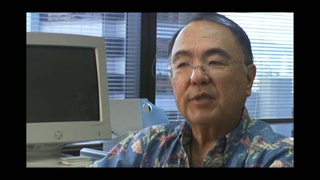Interviews
Positive experiences with Asian Americans for Action
It (Triple A1) was an experience for me. It made me much more aware of the faults of this system, in terms of [injustices to] non-whites. The first march I participated in with AAA, Asian Americans for Action, was devastating for me because to be yelled at when you’re walking in [protest demonstrations] the streets, “Go back to where you came from,” “Gooks!”—just hateful things. It was very hard for me to take.
The funny part of it was that newspapers were taking pictures of Asians. We [Asian Americans] were not known to be loudmouths or protesters so publicly. But here were these—primarily younger people, but a few of us various senior citizens—marching the streets. And wouldn’t you know a picture that appeared in the Village Voice of that big march, [and] right in the center was me. (laughter) I thought, “Wow, okay, the family is going to find out about this one.” (laughs) Sure enough they did. “What are you doing?”
But it was all right. I knew it was for a righteous cause in which we were involved. We got involved in this, including Lisa2, too. She became much more interested in things outside of our little family, outside of our community, which was really a good thing—a real good thing.
1. Founded by Kazu Iijima and Shiz “Minn” Matsuda, Asian Americans for Action, or Triple A, was one of the first East Coast pan-Asian organizations. Triple A stressed concerns for ethnic identity and pride, which underscored the philosophy of this organization. They sought to bring together various Asian American groups to motivate and mobilize them to political action.
2. Lisa Jo Abe Furutani is the narrator’s second daughter born in 1951.
Date: August 26, 1998
Location: Virginia, US
Interviewer: Darcie Iki, Mitchell Maki
Contributed by: Watase Media Arts Center, Japanese American National Museum
Explore More Videos

Being an American soldier and an "enemy alien"
(1923-2011) Lawyer, MIS veteran, founder of Francis and Sarah Sogi Foundation

Not relating to Japan Americans' experiences on the mainland
(1923-2011) Lawyer, MIS veteran, founder of Francis and Sarah Sogi Foundation


Less information about Hawai‘i in mainland
(b.1944) Founder of Kobayashi Group, LLC

Feeling angry upon reading of Supreme Court case, 'Korematsu v. United States'
(b. 1955) Lawyer

Reasons for conformity and competitiveness in Gardena, California
(b. 1946) Lawyer

Role of the redress movement in helping Nisei to open up about their wartime experiences
(b. 1946) Lawyer



Japanese American railroad workers are fired following the bombing of Pearl Harbor
(b. 1923) Chick sexer

Losing job with railroad because of being Japanese American
(b. 1923) Chick sexer

A racist encounter at a movie theater following the bombing of Pearl Harbor
(b. 1923) Chick sexer

Father interrogated by FBI, but not taken away
(1925 - 2018) Nisei educator from Hawai‘i

The political effects on Nikkei during the war (Spanish)
(b. 1950) Nisei Chilean, Businessman

No discrimination in Argentina (Spanish)
(1925-2014) La Plata Hochi, Journalist
